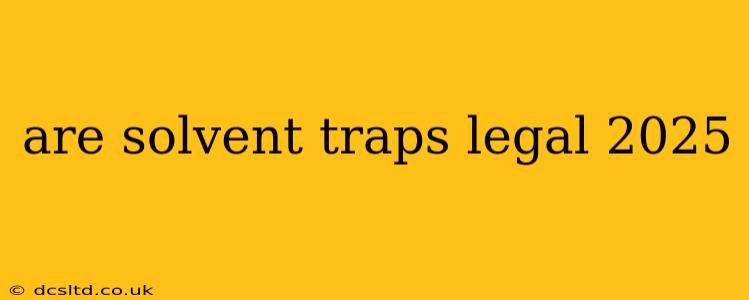The legality of solvent traps is a complex and constantly evolving issue, making it difficult to give a simple yes or no answer. The answer depends heavily on your location, the specific design of the device, and how it's used. While some consider them legal, others view them as unregistered firearms, and the legal landscape is shifting. This guide will navigate the complexities surrounding solvent traps and their legality in 2025 and beyond.
What is a Solvent Trap?
A solvent trap is a device typically made of metal tubing with various attachments designed for cleaning firearm parts. It's often marketed for cleaning solvents and other gun maintenance tasks. However, the design bears a striking resemblance to a silencer or suppressor, raising concerns among law enforcement and regulatory agencies. The core issue lies in the potential for a solvent trap to be easily converted into a firearm silencer.
The Legal Grey Area
The ambiguity stems from the lack of explicit federal regulation specifically targeting solvent traps. The Bureau of Alcohol, Tobacco, Firearms and Explosives (ATF) has historically taken a case-by-case approach, examining the intended use and the device's configuration. If a solvent trap is determined to be primarily intended for use as a firearm silencer (even if it's also used for cleaning), it will likely be classified as a regulated firearm accessory.
Key Factors Determining Legality
Several factors influence whether a solvent trap is deemed legal:
-
State and Local Laws: State laws vary significantly regarding suppressors and firearm accessories. Some states have stricter regulations than others. It's crucial to check your state's specific laws before purchasing or possessing a solvent trap.
-
ATF Classification: The ATF's classification of a specific solvent trap design is paramount. They consider the device's design, materials, and intended use. A solvent trap with features easily adaptable for silencing purposes is more likely to be classified as illegal.
-
Intent and Use: The intended purpose is vital. If a device is advertised or used primarily for silencing firearms, regardless of its design, it will be considered illegal, even if also used for cleaning.
-
Modifications: Modifying a solvent trap to enhance its silencing capabilities or to fit specific firearms can dramatically change its legal standing. Any alterations that clearly demonstrate an intent to use the device as a suppressor will be viewed as illegal.
Frequently Asked Questions (PAA)
Here are some frequently asked questions about solvent traps and their legality, based on common searches:
1. Can solvent traps be used as silencers?
While solvent traps are marketed for cleaning, their design allows for potential adaptation to act as a silencer. The ATF closely scrutinizes this potential. Modifying a solvent trap to function as a silencer is illegal in most jurisdictions.
2. Are solvent traps legal federally?
There is no specific federal law directly prohibiting solvent traps. However, the ATF can classify a solvent trap as an unregistered firearm silencer based on its design, intended use, and modifications. This classification would make possession illegal under federal law.
3. What are the penalties for possessing an illegal solvent trap?
Penalties vary depending on the jurisdiction and specific charges but can include significant fines and imprisonment.
4. How can I ensure my solvent trap is legal?
The safest approach is to avoid purchasing anything marketed as a solvent trap. Instead, stick to officially approved cleaning tools and accessories. If unsure, consult with a firearms lawyer or local law enforcement agency to clarify your area's legal position.
5. Are there legal alternatives to solvent traps for cleaning firearms?
Yes, there are many approved and legal methods and tools for cleaning firearms. These range from simple brushes and cleaning rods to commercially available cleaning kits that are explicitly designed for this purpose.
Conclusion:
The legality of solvent traps remains ambiguous. To avoid legal trouble, it's crucial to thoroughly research your state and local laws. Understand that the ATF's interpretation and potential classification significantly influence a solvent trap's legality. Prioritizing legal, approved cleaning methods is the safest and most responsible approach. This information is for educational purposes only and should not be considered legal advice. Always consult with legal counsel for advice tailored to your specific circumstances.
